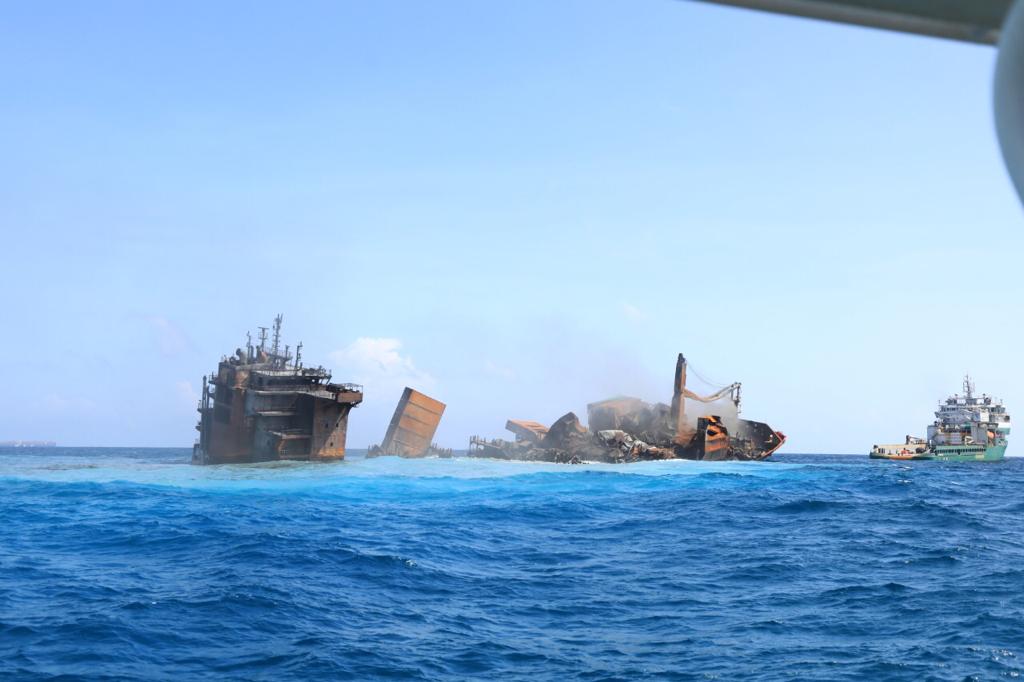UK Strikes at Heart of Russia’s Arctic Energy Empire
New maritime services ban threatens to sever lifeline for Yamal LNG exports By Paul Morgan (gCaptain) – In the frozen waters above the Arctic Circle, a fleet of specialised ships...

Photo shows the X-Press Pearl as of June 2, 2021. Photo: Sri Lanka Ports Authority
X-Press Feeders, the former operator of the containership X-Press Pearl that caught fire and sank off Sri Lanka’s coast in 2021, has announced it cannot comply with the Sri Lankan Supreme Court’s interim payment order due today. The company was required to pay USD 250 million as part of a broader USD 1 billion compensation ruling issued in July.
In a statement released today, the shipping company expressed its inability to make the mandated payment “whilst we continue to seek engagements with the relevant Sri Lankan authorities.”
“While we respect the judicial process, the ruling leaves open the possibility of additional and potentially unlimited compensation,” said X-Press Feeders CEO Shmuel Yoskovitz. “Any payment towards the judgement could set a dangerous precedent for how maritime incidents will be resolved in the future. It is vital that any compensation is substantiated, proportionate and consistent with international conventions.”
The case stems from the May-June 2021 incident when the X-Press Pearl caught fire and subsequently sank off Sri Lanka’s coast. The vessel was carrying 1,486 containers, including 25 tons of nitric acid loaded in India, along with 297 tonnes of Heavy Fuel Oil and 51 tonnes of Marine Fuel Oil.
According to the company’s timeline, the ship had attempted to address a leaking nitric acid container before the disaster, requesting permission to offload the problematic container at ports in Qatar and India before arriving in Sri Lanka. Both requests were rejected.
X-Press Feeders maintains that it has already contributed over USD 170 million through its insurer for “wreck removal, environmental remediation and compensation claims” in cooperation with Sri Lankan authorities.
The environmental impact of the incident was severe, with microplastic granules covering 80km of Sri Lanka’s western coast and halting fishing activities for months.
The company expressed concern that compensation funds already provided have not reached affected communities, stating they are “deeply disappointed to learn from local reports of Sri Lankan parliament proceedings that compensation payments have not yet reached many affected communities due to delays within Sri Lanka.”
Beyond financial considerations, X-Press Feeders highlighted humanitarian concerns regarding the vessel’s Master, who “has been prevented from returning home for more than four years due to a court-ordered travel ban, causing significant and prolonged distress to him and his family.”
The London P&I Club, involved in the case, previously characterized the July ruling as “an extraordinary and deeply troubling turn of events,” noting that the court levied “a staggering interim payment of USD 1 billion, despite having heard no witness testimony, admitted no expert evidence, and allowed no cross-examination of facts.”
“This is an extraordinary and deeply troubling turn of events, not only for our valued member, X-Press Feeders, but for global shipping,” said James Bean, CEO of The London P&I Club following the July ruling. “The court has taken what began as a rights-based claim against the Sri Lankan government and used it as a basis to unilaterally impose liability on our member and their agents seemingly without due process – with the agents, worryingly being used alongside the Master, as human collateral for their claim.”
One of the most contested aspects of the Sri Lankan court ruling concerns the rejection of limitation of liability principles that form cornerstones of international maritime conventions. The company warns that the precedent set by this judgment “establishes an unprecedented level of risk” for the global shipping industry.
Adding to the legal complexity, proceedings related to the X-Press Pearl are simultaneously ongoing in Singapore—initiated by the Sri Lankan Government’s own representatives—creating what Bean describes as “a fragmented and chaotic legal landscape.”
X-Press Feeders states it remains “open to direct dialogue with the relevant Sri Lankan authorities” in hopes of achieving “an outcome that is evidence-based, fair, proportionate and consistent with international practice.”
The case continues to be watched closely by maritime industry observers for its potential to reshape environmental liability frameworks in international shipping.

Sign up for gCaptain’s newsletter and never miss an update

Subscribe to gCaptain Daily and stay informed with the latest global maritime and offshore news
Essential news coupled with the finest maritime content sourced from across the globe.
Sign Up